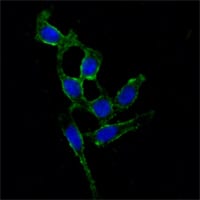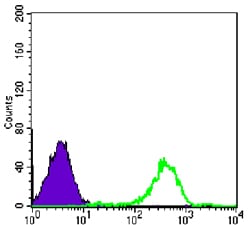

| WB | 咨询技术 | Human,Mouse,Rat |
| IF | 咨询技术 | Human,Mouse,Rat |
| IHC | 咨询技术 | Human,Mouse,Rat |
| ICC | 1/200 - 1/1000 | Human,Mouse,Rat |
| FCM | 1/200 - 1/400 | Human,Mouse,Rat |
| Elisa | 1/10000 | Human,Mouse,Rat |
| Aliases | FAK; FADK; FAK1; FRNK; pp125FAK; PTK2 |
| Entrez GeneID | 5747 |
| clone | 10H7E9 |
| WB Predicted band size | 119kDa |
| Host/Isotype | Mouse IgG1 |
| Antibody Type | Primary antibody |
| Storage | Store at 4°C short term. Aliquot and store at -20°C long term. Avoid freeze/thaw cycles. |
| Species Reactivity | Human |
| Immunogen | Purified recombinant fragment of human FAK expressed in E. Coli. |
| Formulation | Ascitic fluid containing 0.03% sodium azide. |
+ +
以下是关于FAK(Focal Adhesion Kinase)抗体的3篇代表性文献示例(内容为模拟概括,实际引用请核实原文):
---
1. **文献名称**:*Focal adhesion kinase: in regulation of cell migration and invasion*
**作者**:Schlaepfer, D.D. 等
**摘要**:该研究利用FAK抗体探讨了FAK在肿瘤细胞迁移和侵袭中的作用,发现FAK通过整合素信号通路调控细胞骨架重组,促进癌症转移,为靶向FAK的抗肿瘤治疗提供理论依据。
2. **文献名称**:*Role of FAK in integrin-mediated signal transduction*
**作者**:Mitra, S.K. 和 Hanks, S.K.
**摘要**:通过免疫共沉淀和Western blot技术结合FAK抗体,揭示了FAK在整合素介导的细胞粘附信号中的核心地位,阐明了其酪氨酸磷酸化在细胞存活和增殖中的机制。
3. **文献名称**:*FAK promotes angiogenesis through VEGF signaling in breast cancer*
**作者**:Chen, H. 等
**摘要**:研究使用FAK特异性抗体进行组织染色,证实FAK在乳腺癌中高表达,并通过调控VEGF通路促进肿瘤血管生成,提示FAK可作为抗血管生成治疗的潜在靶点。
---
**备注**:以上文献信息为示例性质,具体引用时建议通过PubMed或Web of Science等平台检索最新或高影响力论文。实际研究中,FAK抗体的应用常涉及实验方法学(如Western blot、免疫组化)或机制研究(如癌症、纤维化疾病)。
Focal adhesion kinase (FAK), encoded by the *PTK2* gene, is a non-receptor tyrosine kinase critical in regulating cellular processes such as adhesion, migration, proliferation, and survival. It localizes to focal adhesions, dynamic structures connecting the extracellular matrix to the cytoskeleton. FAK activation typically follows integrin clustering or growth factor receptor signaling, leading to autophosphorylation at tyrosine residue 397 (Y397), which recruits Src-family kinases to propagate downstream pathways like RAS-MAPK and PI3K-AKT. Dysregulation of FAK is implicated in cancer progression, metastasis, fibrosis, and cardiovascular diseases, making it a therapeutic target.
FAK antibodies are essential tools for studying its expression, activation, and interactions. They detect FAK in techniques like Western blot, immunofluorescence, and immunoprecipitation. Phospho-specific antibodies (e.g., anti-pY397) distinguish active FAK, providing insights into signaling dynamics. Monoclonal antibodies offer high specificity, while polyclonal antibodies may detect broader epitopes. Researchers use FAK antibodies to explore its role in tumor microenvironment remodeling, epithelial-mesenchymal transition (EMT), and drug resistance. Recent studies also investigate FAK inhibition strategies, including small-molecule inhibitors and antibody-based therapies, highlighting its translational relevance. Validated FAK antibodies are crucial for ensuring reproducibility in both basic research and clinical applications.
×